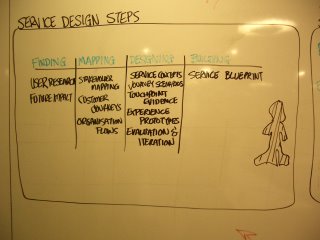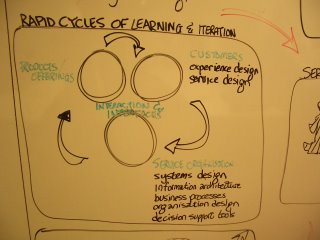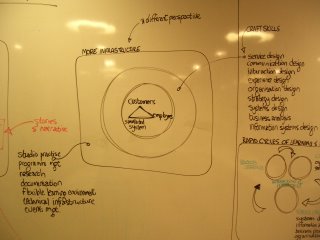
ORGANISATION, STRATEGY & DESIGN
SOCIAL PROTOTYPING & SERVICE DESIGN : GARRICK JONES : 13.02.06
The value of an inter-disciplinary approach was highlighted in the conversation that was sparked by this presentation. The discussion was enlivened by a diverse group consisting of architects, interaction and communication designers, social psychologists, public policy researchers and business analysts.
Garrick presented research being developed in conjunction with the Service Design Group Radarstation
Radarstation The team are working on synthesising a systems ecological approach to Social Prototyping. Their approach not only recognises the requirements for understanding and navigating the labyrinth of social and technical systems, they also seek to develop outcomes from a user perspective. Rapid iterations of hi-fidelity prototypes, coupled with flexible learning infrastructures enable teams to understand user requirements on a large scale. The case studies applied were looking to deploy service changes in organisations of 60,000 or more employees, servicing millions of customers.
QUESTIONS
Key questions underpinning the research are:
- How to conduct a customer centric, service led initiatives at that scale?
- How to organise a user-centred approach that enables implementation within very large communities?
- How to do so in a way that keeps risk low, costs low and enables large organisations to effectively learn by doing?
"For the truth of our world is that there are as many languages as there are communities, activities or kinds of knowledge...there is a multiplicity of language games." Alain Badiou
Infinite Thought p35.


TERMS
Systems Ecology
Business Design a definition - the application of design processes, tools and techniques into the strategic development, research and innovation of operational processes of Business.
Social Prototyping forms a component of the Service Design approach.
Service Design
A number of shifts can be identified that support the emergence of these processes:
- the shift from informal to formal support infrastructures for continuous organizational learning and development
- the shift toward partnering, and creation of services through aggregation of services provided by multiple stakeholders
- the shift toward the prototyping of services and systems within the business as a means of managing risk and ensuring successful implementations
- the shift from process transformation to business systems design as means of enabling business change
- the increasing use of design craft skills alongside business analysts
- the tendency to create bespoke spaces for this work – sometimes called Innovation Centres, Design Labs, Solution Centres or Hothouses – to enable continuous rather than ad hoc learning and development of services which act at the margins of the business
- the creation of sophisticated problem solving environments such as Flexible Learning Environments within the business
- a commitment to parallel prototyping and testing of the systems (people information, technical, process, social), organizational design, measurement, outcomes – an approach sometimes called Social Prototyping.
- Establishing formal organizations to support these endeavours within the business
We identify these shifts as symptomatic of a larger trend in Business - the move from controlling Superstructure to enabling Infrastructure.

Just as the Design of physical artefacts are honed through iteration, prototyping and user feedback – it becomes vital to test all the systems that support and enable new Services, offerings and products in a safe environment. Such an approach mitigates risk, and builds solutions from the customers and employees outwards.
Environments that demand large scale solutions requires this work to be organised and sequenced in particular ways.


Social Prototyping seeks to simulate the implementation of a vision, through small, live, controlled processes. Teams are established who seek to deliver the new services and products to customers in as live a situation as possible. The idea is that rapid feedback and cycles of learning enable the services and customer experience to be honed to the point that the services meet the qualitative, and values requirements of business, as well as the cost, systems and operational capabilities.

Through processes of constant enquiry, feedback and problem solving, the things that work well with customers are quickly identified and amplified. Services and offerings are implemented along growth and learning trajectories – that is the entire system is grown as a means of implementation.
Inter-disciplinary teams enable more powerfully considered solutions at every stage of the process. The craft skiils we identify as being useful for these approaches include Service Design, Interaction Design, Communication Design, Experience Design, Organisation Design, Strategy Design, Systems Design, Business Analysis, Information Systems Design, Programme Management.
CASES
Disaster - Credit Card implementation and the jailing of a UK customer in Japan.
Disaster - Settlement of new arbitrage instrument disaster – tax implications, and customer experience
Disaster 0 New postal delivery products introduced without thinking about processing capability of the system, carrying volume of door to door agents, evening post products sold to clients, without understanding the entire system constraints
Success - New car hire service designed prototypes leading to successful business
Success - Airplane launched with licensing on both sides of atlantic and built with customer input
PHILOSOPHICAL FOUNDATIONS [NOTES]
- emergence of outcomes, superstructuration and interstructuration
- emergence - where entity, structure, concept arises from existing material - emergence is both ontological and epistemological
- emergence is linked to superstructuration - superimposition of the emergent level on the pre-existing and intrastructuration intra-position of the emergent level within the pre-existing one.
- in Marxist terms high-order agencies set the boundary conditions for for operation of lower-order conditions
- however higher-order agency may also include materially constructured infrastructure, which enables collaborating groups to both establish the pre-conditions for emergence of outcomes, and experience the outcomes within time
- mind/body dualism is negated through a constructivist approach where individuals act with intentional agency through construction
- against reductionism
- models play a central role through the
semantic view of theories Nancy Cartwright "most articulated and well illustrated by the German structuralists, that a theory is not a set of claims as the Logical Positivists maintained but rather a set of models (Balzer et al. 1987). In opposition to laws some authors are explicit in arguing that the models that constitute theory and that satisfy its laws are not the models that proide our best descriptions of the world (Gierre1999; Cartwright 1983; Cartwright et al 1995; Suarez 1999). The theory is at best a foundation from which more accurate models are built, by improvement and correction, models that in the end no longer satisfy the laws. (Cartwright et al 2005)
- the ontological forms of physical environment
- visualisation
- constructivist approaches













 subscribe to our feed
subscribe to our feed